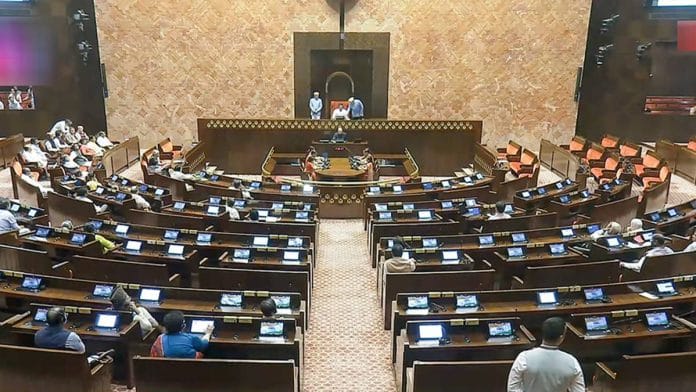New Delhi: The Narendra Modi-led NDA government plans to introduce in Parliament next week a bill that proposes to decriminalise more than 36 minor offences and replace them with warnings at the first instance of violation, and penalties for subsequent violations, ThePrint has learnt.
From agriculture to industries, transport to electricity and municipal services, textile to coir, the Jan Vishwas (Amendment of Provisions) Bill, 2025, proposes to amend several laws in order to decriminalise and rationalise offences that will “reduce compliance burden”, “improve ease of living” and “enhance trust-based governance”. ThePrint has accessed a copy of the bill.
The bill’s statement of objects and reasons circulated to MPs states: “The cornerstone of democratic governance lies in the government trusting its own people and institutions. A web of outdated rules and regulations causes trust deficit. It has been the endeavour of the government to achieve the principle of ‘minimum government maximum governance’, redefining the regulatory landscape of the country under ease of living and ease of doing business reforms.”
The fear of imprisonment for minor offences, the bill states, is a “major factor” hampering the growth of the business ecosystem and individual confidence.
“The endeavour is not only to make lives and businesses easier but also to reduce judicial burden. Settlement of a large number of issues, by compounding method, adjudication and administrative mechanism, without involving courts, will enable persons to remedy minor contraventions and defaults, sometimes committed unknowingly by them, and save time, energy and resources,” the statement adds.
Among the laws that will be amended includes the Motor Vehicles Act, 1988, Reserve Bank of India Act, 1934, Central Silk Board Act, 1948, Road Transport Corporations Act, 1950, Tea Act, 1953, Apprentices Act, 1961, Coir Industry Act, 1953, The Delhi Municipal Corporation Act, 1957, New Delhi Municipal Council Act, 1994, Electricity Act, 2003, and Textile Committee Act, 1963.
Besides decriminalising minor offences, the bill also proposes to amend 20 provisions of the Motor Vehicles Act and 47 provisions of the New Delhi Municipal Council Act to facilitate ease of living, which will serve as a “significant step in saving time and cost for all concerned”.
Several archaic sections, subsections and clauses in these laws are proposed to be omitted altogether or simplified and rationalised. Several clauses, which till now invoked punishment or penalty, have been decriminalised.
For instance, currently, in The Drugs and Cosmetics Act, 1940, manufacture and sale of ayurvedic, siddha or unani drugs is punishable with six months’ imprisonment and fine of Rs 10,000. The Jan Vishwas Bill proposes to replace the jail term with only a fine of upto Rs 30,000.
Similarly, in The Electricity Act, 2003, non-compliance of orders or directions under Section 146 has been decriminalised. The current three months’ jail term and Rs 1 lakh fine for the act has been replaced by Rs 10,000 fine, which may extend to Rs 10 lakh.
In the Legal Metrology Act, 2009, certain sections have been amended and hefty fines for first time violations have been replaced with “warnings with an improvement notice”. For subsequent violations, a penalty will be levied.
The bill also proposes to delete over a dozen sections of The Delhi Municipal Corporation Act, which have long lost relevance or do not serve any practical purpose in the present day. For example, the Act provides for a Rs 100 penalty for hawking articles for sale without licence. The bill proposes to omit this.
In several other laws including the Motor Vehicles Act, the contravention of rules, which earlier invited penalties in the very first instance, has been substituted with a warning notice for the first offence.
For instance, under Section 194F of the Act, if a person driving a motor vehicle is sounding the horn needlessly or sounding a horn in an area where it is prohibited, he or she has to cough up a fine of Rs 1,000 for the first offence and Rs 2,000 for the second or subsequent offence. The bill proposes to replace the fine in the first instance with a warning and for the second and subsequent offence, impose a penalty of up to Rs 2,000.
“The goal of Jan Vishwas Bill is to create a more business-friendly environment and promote ease of living by eliminating unnecessary legal hurdles and simplifying the regulatory landscape. The initiative underscores India’s commitment to creating a predictable, transparent and fair regulatory environment,” reads the bill’s statement.
The fines and penalties provided under various provisions are also proposed to be increased by 10 percent of the minimum amount of fine or penalty, as the case may be, at the expiry of every three years from the date of commencement of the Act.
(Edited by Nida Fatima Siddiqui)






